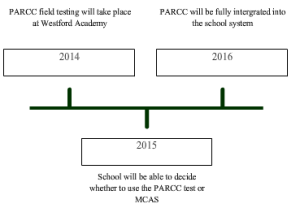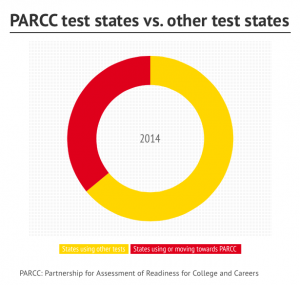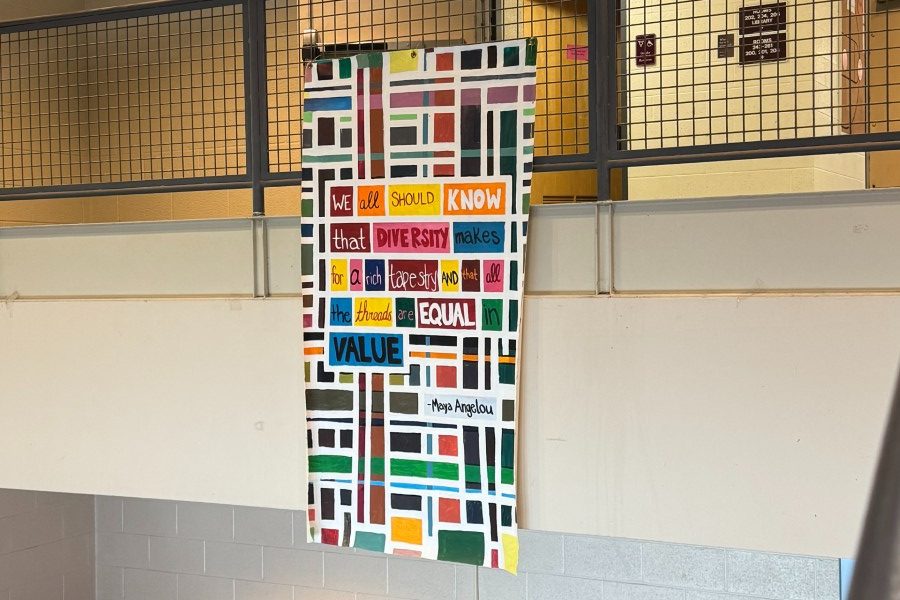By Kai-Lou Yue
Business Manager
Every year from 1st to 10th grade, students in Massachusetts have to take the Massachusetts Comprehensive Assessment System (MCAS) test during the second half of the school year. It is an unavoidable occurrence for students in all Massachusetts public school systems, including Westford. Usually, by the time students are in high school, the MCAS is a familiar test. However, that may change with the integration of a new assessment into Massachusetts schools over the next few years.
Known as the Partnership for Assessment of Readiness for College and Careers (PARCC), this test complies with the Common Core State Standards (CCSS) which many states across the country have already adopted. Massachusetts incorporated the standards into its school systems in 2011.
“A group of states, and the education chiefs in those states, and the governors of those states, got together and they decided that they wanted to start a new look at assessments, and they started putting something together called the … Common Core State Standards,” said Christine Francis, the Assistant Superintendent of Westford Public Schools.
Whether Westford students know it or not, WA’s curriculum has slowly been reworked over the last few years in order to fit these new standards. However, while the standards aren’t entirely new, the PARCC test is. This year, for the first time, the PARCC test will be field tested in two classes of CP1 and honors geometry, and a class of English 11. The field testing is merely for the benefit of the test makers, as the school will not be able to see any of the test scores; students who partake in them will still be required to take the MCAS. Two math field tests will also be held at the Stony Brook Middle School in the 6th grade.

In 2015, schools in MA will be able to weigh in regarding whether they want to administer the PARCC or the MCAS. If the state board of education votes to use the PARCC test, an outcome which Francis believes will be likely, then all schools will be mandated to use the new test system.
Although the majority of the teachers and school faculty, including Principal James Antonelli, have not seen high school level samples of the new test yet, they are aware of changes for the school and students that the test will cause.
“It’ll be very interesting to see where PARCC goes in regards to the questions and so forth,” said Antonelli. “We have three [field] tests that are coming up in English Language Arts and in Geometry, and it’ll be interesting to ask those students after [what those tests were like], because we don’t get any [scores] from that.”
Unlike the MCAS, students taking the PARCC will be exposed to more performance based questions. For example, students may be asked to solve questions like the MCAS math open response questions, but with more in-depth explanations.
“Students should answer all parts of the question that they can, and that might have to be one of the changes that we make in the math classes […] they call it mathematical practices […] in terms of more writing that the students would have to do […] [They] came along with the Common Core. We’ve already started it with the school wide rubrics for writing […] more writing and explaining their reasoning for why they’re are [solving the problem like] this. Explaining the steps,” said Math Curriculum Coordinator Cathy Coughlin.
In addition to the changes regarding the types of test questions, Westford schools may also have some difficulty changing over to PARCC. Another difference from the MCAS is that this future test will have a computer-based set of questions that students will be required to complete online. However, many Westford schools do not have enough resources for an entire grade to take the test on the computer at the same time. In the case of WA specifically, the school does not have the bandwidth to allow a large number of internet connected appliances working simultaneously.
According to Coughlin, there has been debate about whether the school will do one-on-one testing, which would require each student to have their own school-provided device, whether it be a notebook computer, an iPad, or a laptop. The school would either have to buy, rent, or lease this technology. Another option would be for students to take the test at different times using the currently available devices, but that would raise the possibility of cheating. Both solutions could prove costly for the school.
Among the WA administration, there have been mixed feelings towards the PARCC, although the common consensus is that WA students do well on the MCAS. For faculty such as English Curriculum Coordinator Janet Keirstead and head guidance counselor Wendy Pechacek, it is still too early to tell if the test will be beneficial for students.
“I think it’s still a little too early to tell,” said Keirstead. “There have been some indications that there will be positive changes […] but there is a potential for a slightly negative change.”
Pechacek added, “I know that our students do well on MCAS … I’d always really stay with something I’m comfortable with than try something new, but it’s likely that our kids will do well on [the PARCC] too […] I guess as long as it’s implemented thoughtfully and carefully […] I would support it.”
Antonelli, on the other hand, does not support the change.
“I don’t necessarily agree with [the switch]. I think that the MCAS exam has been a good assessment program for us … I’m curious to see whether or not PARCC is going to have a significant impact in our schools. If I [were] to focus the money, I would focus less on the higher performing schools such as Westford Academy and Lincoln-Sudbury and Concord Carlisle. I would focus more of the money and the funding towards the under-performing schools,” said Antonelli.
Despite some negative reactions to the change from MCAS to PARCC, the Westford school system can do nothing to prevent the tentative replacement test, as changing the statewide test is a decision made by the state itself. As a result, most teachers are aware of the test’s presence, although the majority are not well informed on the content of the test.
Other than what the PARCC test makers themselves give to the school systems, there are different ways to obtain information about the new test. PARCC has a website, and there are other sources of information such as a publication that Keirstead mentioned.

“I’m also a member of an organization called the National Council for Teachers of English […] and they have been publishing articles about the fact that many schools are going to go to the PARCC,” said Keirstead.
Additionally, both the CCSS and the PARCC test have been integrated into school systems in other states around the country. Massachusetts is not one of the first to be switched over. There are 18 states, 36% of all states, currently using PARCC as their statewide test, and 45 states have implemented the CCSS.
For Massachusetts, the plans to change tests are still in the works. However, Antonelli believes that the state will almost certainly continue with replacing the MCAS.
“My gut tells me they’re going to keep going with it,” said Antonelli. “I think the train has left the station.”
He added, “When we get more information about PARCC and the implementation, I’ll share that with students, faculty, and our parent community. But right now, there’s really limited information regarding how the process will really unfold.”
For additional information about the PARCC test, visit the test’s website.






